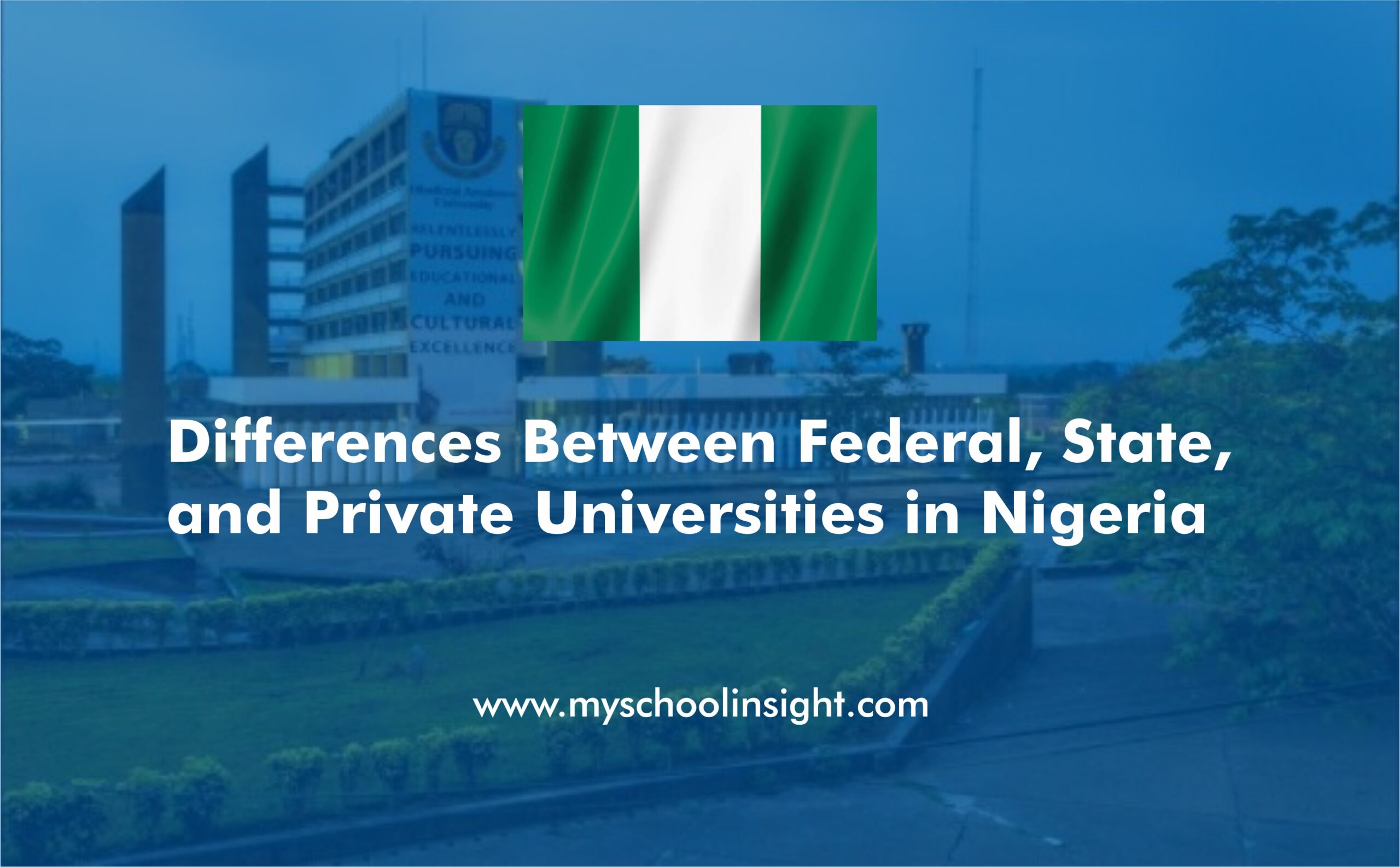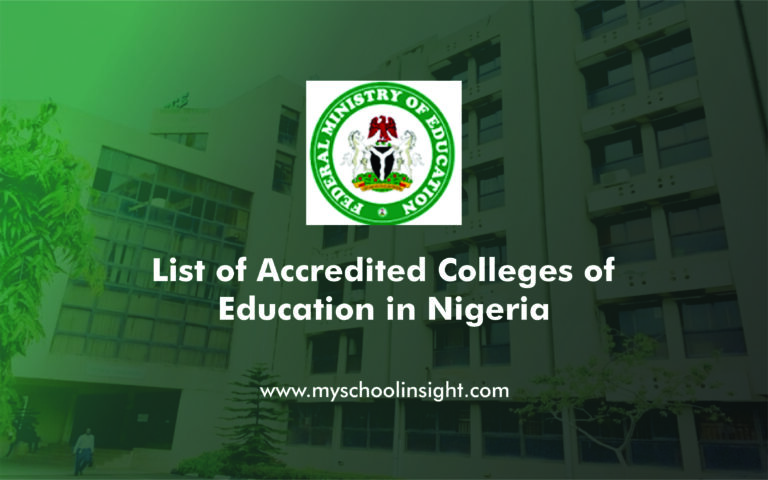Differences Between Federal, State, and Private Universities in Nigeria: A Comprehensive Guide

Introduction
Nigeria is the largest African nation which successively increased its tertiary education sector during the last decades. As the number of people in their youth and the demand of university education has heightened, the private and the Nigerian government have set up different institutions of higher learning. The general category of these institutions comprises federal, state and private universities, each having its own set of administrative organization, source of funding, academic calendar and implication on cost.
It is very important that students, parents and guardians who are attempting to move within the higher education landscape in Nigeria understand the difference between these categories. It also enables educational consultants, school counselors and international observers to know how Nigeria tertiary education system functions.
This paper gives an in-depth discussion of the comparisons between federal, state and private universities in Nigeria- key areas of discussion include the ownership, financing, tuition fee, admission process, quality of education, improvement of infrastructure as well as the experience of students in these different universities.
1. Ownership and Funding Structure
One of the major distinguishing factors between the three categories of universities is who owns and funds them.
Federal Universities
Federal universities are the institutions owned and maintained by Federal Government of Nigeria. Their funding is majorly done by the federal government grants at the Ministry of Education. These universities also enjoy TETFund (Tertiary Education Trust Fund) assistance which is committed in advancing infrastructure, research and academical development in government institutions.
Federal government is the provider of staff salaries, capital projects and recurrent expenditure. Well known are University of Lagos (UNILAG) University of Ibadan (UI) Ahmadu Bello University (ABU) and University of Nigeria, Nsukka (UNN) which are all federal universities.
State Universities
State universities are those universities formed and run by the state governments. All the 36 states in Nigeria boast of multiple state owned universities. Such institutions are financed by the state government grant as well as internally generated revenue (IGR) and at times intervention funds such as tetfund funds.
The consistency in the funding of different states is very elusive and this is pegged on the basis of the financial soundness and willingness by the government of the state. These are Lagos State University (LASU), Delta State University (DELSU), Rivers State University (RSU).
Private Universities
Individuals, religious organizations or corporate bodies own the private universities. They do not recieve state support and instead use the tuition fees, endowments, contributions, and in some cases international alliances entirely. Such universities are operated as privately owned businesses and seek to deliver the highest level of education which is sometimes at high payment.
They are Covenant University, Babcock University, Afe Babalola University (ABUAD) and Landmark University.
2. Tuition Fees and Financial Accessibility
Cost is one of the most significant factors affecting students’ choice of university in Nigeria. The tuition fee structure varies widely between the three university types.
Federal Universities
In Nigeria, tuition fee is the lowest in federal university. This is due to the fact that their operations are hugely subsidized by the Federal Government. The average fee paid annually by the students in federal universities varies between 20000 and 60000 naira depending on the Program of Study.
Tuition is nearly free and in the vast majority of the cases, what a student pays is called a charge or service fee on things like the use of laboratories, health insurance, ICT services and sports development.
But the economic crunch and building inflation have led to a few minor changes in fees charged in some of the federal universities. However, they are still the cheapest ones to millions of Nigerian students.
State Universities
State-owned universities are more expensive than federal ones. Students typically pay between ₦70,000 and ₦200,000 per academic session. These rates depend on the course of study, whether the student is an indigene or non-indigene of the state, and the availability of government subsidies.
Some state governments provide discounts to indigenes as a way to encourage local enrollment, but financial constraints often limit how much subsidy can be offered.
Private Universities
Private universities are the most expensive in Nigeria. Tuition fees range from ₦300,000 to over ₦2,000,000 per session. Medicine, engineering, and law are among the costliest programs in these institutions.
Despite their high fees, private universities often offer modern facilities, well-furnished hostels, 24/7 electricity, and a more structured academic environment. Some also provide scholarship programs and flexible payment plans to attract brilliant or financially challenged students.
3. Admission Process and Competitiveness
Federal Universities
Admission into federal universities is highly competitive due to their national reputation and low tuition costs. These institutions often attract the best-performing students in the Unified Tertiary Matriculation Examination (UTME) and Post-UTME screenings.
Cut-off marks for federal universities are generally higher. For example, universities like UI, UNILAG, and UNN often require UTME scores above 200, especially for professional courses such as Medicine, Law, and Engineering.
State Universities
Admission into state universities is less competitive compared to federal ones. While they also conduct UTME and Post-UTME screening, their cut-off marks are usually lower. Additionally, most state universities give admission preference to indigenes, which improves their chances of gaining admission.
In states like Delta or Ogun, an indigene with a slightly lower score may gain admission ahead of a non-indigene with higher scores.
Private Universities
Private universities operate with more flexible admission policies. Many admit students who meet the minimum UTME score of 160, and some allow direct entry based on A-levels, IJMB, or JUPEB results. Because they are less reliant on public entrance examination rankings, they offer alternatives for students who were not admitted into public universities.
4. Academic Calendar and Strikes
Federal Universities
One of the biggest drawbacks of federal universities is their frequent involvement in strikes, particularly those organized by the Academic Staff Union of Universities (ASUU). Strikes can last from a few weeks to several months, significantly disrupting the academic calendar and delaying graduation.
State Universities
State universities also experience ASUU-related strikes, especially if the state chapter of ASUU aligns with the national body. However, the impact varies by state. Some state universities, like LASU and RSU, have enjoyed periods of stability by remaining outside national ASUU strikes.
Private Universities
Private universities are not part of ASUU and rarely experience industrial action. As a result, they maintain stable and predictable academic calendars, allowing students to complete a 4-year course in exactly four years. This is a key selling point for parents and students who want timely graduation.
5. Infrastructure and Facilities
Federal Universities
Despite having some of the oldest campuses and most experienced faculty, many federal universities struggle with overcrowded classrooms, aging infrastructure, and insufficient teaching aids. These challenges are often due to underfunding and a rapidly growing student population.
Nevertheless, universities like UNILAG and ABU have invested significantly in upgrading their research labs, ICT centres, and hostels through intervention projects.
State Universities
Infrastructure in state universities varies greatly. Some states invest heavily in education, while others struggle to maintain basic facilities. As a result, the quality of buildings, laboratories, libraries, and ICT infrastructure can range from excellent to poor.
For instance, Ekiti State University (EKSU) may face challenges in electricity supply, while a better-funded institution like LASU boasts well-equipped lecture theatres and hostels.
Private Universities
Modern infrastructural facilities are normally deployed in private universities in order to attract and maintain students. Most of the classrooms are air-conditioned and lecture halls are fitted with smart boards and the hostels are comfortable.
Security, clean environment, and reliable 24 hours electricity are also experienced in some of the private universities establishing an ideal learning environment. An example is Covenant University that possesses state of the art ICT labs and architectural excellence.
6. Academic Quality and Research Output
Federal Universities
Federal universities generally have highly qualified faculty members, including professors, researchers, and PhD holders. They also tend to produce significant volumes of academic research, often collaborating with foreign institutions.
However, research is often hindered by bureaucratic bottlenecks, insufficient research grants, and poor laboratory infrastructure.
State Universities
The academic quality of state universities varies based on government support, staff motivation, and investment in research. While some state institutions have earned national recognition, others face challenges like low staff morale and inadequate funding for research projects.
Private Universities
Private universities often prioritize teaching over research but are increasingly investing in faculty development, research funding, and international collaborations. Institutions like Afe Babalola University and American University of Nigeria are known for their academic rigor and research incentives.
In private universities, student-teacher ratios are better managed, promoting more interactive and effective teaching.
7. Student Lifestyle and Moral Discipline
Federal Universities
Student life in federal universities is generally vibrant and diverse. With students from every state of Nigeria, these institutions promote national integration and expose students to different cultures and beliefs.
However, issues such as cultism, overcrowding, and limited hostel space are common challenges. Despite this, federal universities offer a rich social life, with numerous student unions, cultural groups, and academic clubs.
State Universities
Student life in state universities is more localized, with a larger proportion of students coming from the host state. The social environment is usually influenced by the region’s culture and the university’s moral codes.
Hostel space and campus security vary across state universities, and students often live off-campus due to limited accommodation.
Private Universities
Private universities are known for their strict discipline and codes of conduct. Many are affiliated with religious organizations, which influence rules on dressing, behavior, and social activities.
Alcohol consumption, night outings, and romantic relationships are often regulated. This structured environment appeals to parents seeking moral discipline, but some students may find it overly restrictive.
8. Course Availability and Accreditation
All Nigerian universities are overseen by the National Universities Commission (NUC), which approves and accredits academic programs.
Federal Universities
Federal universities offer the widest range of academic programs, including Medicine, Pharmacy, Law, Engineering, Agriculture, and more. Most of these programs are NUC-accredited and internationally recognized.
State Universities
State universities also provide a broad range of courses, but accreditation may take longer due to staffing and funding limitations. Prospective students should always verify the accreditation status of their intended course.
Private Universities
Private universities often begin with a limited number of programs and gradually expand. Most start with courses in Social Sciences, Management, and Computer Science before adding Medicine or Engineering.
Accreditation is taken seriously, and many private universities seek early approval to maintain credibility.
Conclusion: Making the Right Choice
Choosing between a federal, state, and private university in Nigeria is a major life decision that should be based on several factors:
- Financial capacity
- Academic goals and program accreditation
- Expected graduation timeline
- Desire for discipline or social freedom
- Availability of facilities
- Tolerance for academic interruptions (e.g., strikes)
Each category has its pros and cons. While federal universities offer affordability and national prestige, state universities serve regional interests with moderate fees, and private universities guarantee stability, discipline, and modern learning environments.
By evaluating your personal goals and circumstances, you can make the best choice for your future.





